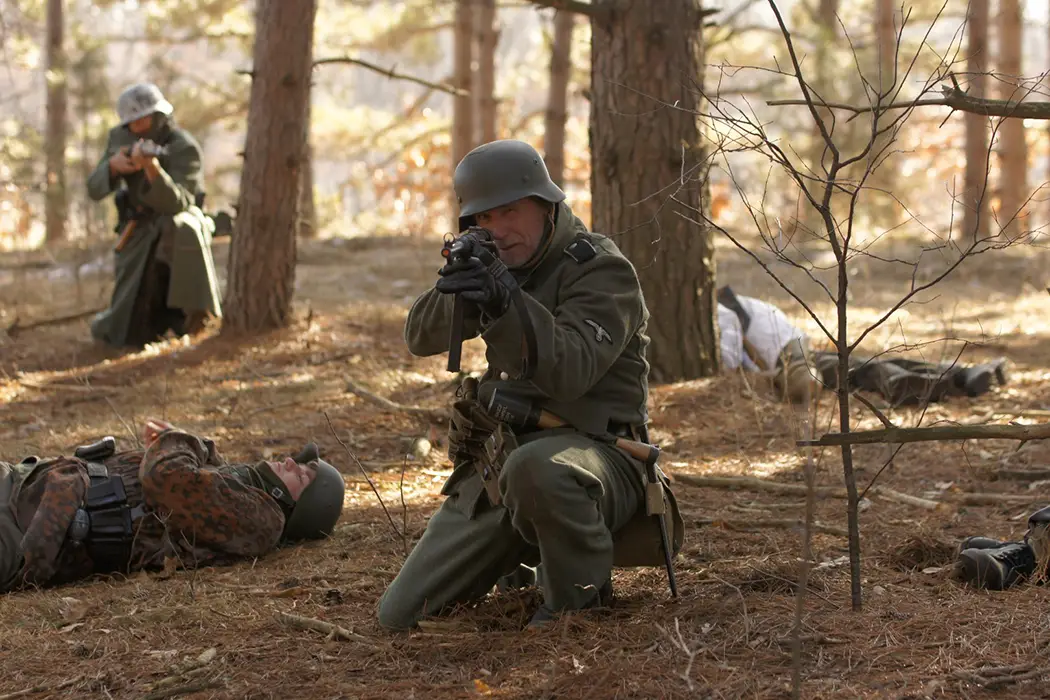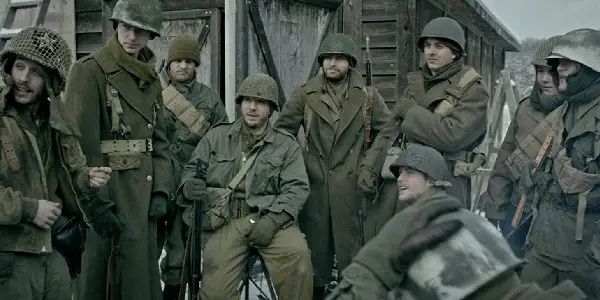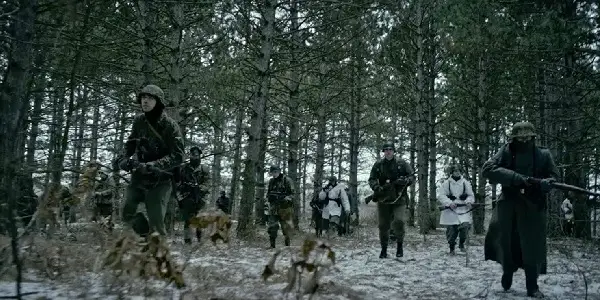WUNDERLAND: Trite War Film Is A Failure On Multiple Fronts

Tom is a recent graduate based in the UK, who…
There are too many films about the Second World War. Of course, it was a global tragedy, but repeated iterations of similar stories doesn’t change that, or shine any more of a light on it – especially not when many of the films are bad. For every Saving Private Ryan there’s a The Monuments Men; for every Son of Saul there’s an Iron Skies (which counts!).
Sadly Wunderland is in this latter camp – it’s a war film that doesn’t say anything about war. It tells the story of a platoon of men defending a forest in Belgium during the Battle of the Bulge, the last German offensive of the war.

The film is let down on all fronts – the ill-defined characters have no motivations, arcs, or comprehensible relationships; the script is little more than a list of clichéd ‘army phrases’, the direction and editing trip themselves on numerous occasions; the music, while actually rather fine, is too bombastic for the material it accompanies and picks up on curiously inappropriate cues.
But on top of that, the film isn’t trying to say anything about the war. It’s simply a sequence of scenes of people walking through the woods or shooting guns at each other, with no overarching moral or message between the scenes – until after the credits, in which the film dedicates itself to the 20 recipients of the Medal of Honor from the battle, and provides brief biographies to their feats. While it is clearly sincere in its respect to these heroes, a post-credits scene is far too late in a film to introduce a theme!
Crazy Continuity
While many of the aspects of the film are mediocre, the direction and script seem to actively obfuscate the drama and action of the film, with characters contradicting themselves within the same sentence, or scenes shot in a misleading way.
One example is a scene in which our heroes are lying in wait to ambush a convoy that’ll be coming along the road. It’s meant to be a tense scene – these soldiers will be along the road any minute. Footage of the heroes waiting is intercut with footage of the enemy soldiers pacing through some woods, and not on the road – we’re lead to think the enemy soldiers have outsmarted the heroes. It’s tense, because the heroes are being crept up on… until we see the enemy soldiers on the road anyway.
This strange direction mitigates any tension felt by the scene – if the soldiers were meant to be coming along the road, why do we see them walking through woods? The audience is misled by the lack of foresight in the direction, and any actual tension for the scene is ruined.

Similarly, the script trips over itself at times. One conversation, between a sergeant and someone below him in rank who is digging a trench, goes (approximately) as follows:
“You’re not meant to be digging to China!”
“Well why don’t you dig then?”
“No, see this? (Indicates patch that shows rank) Now come on, keep digging”.
Over the course of two lines, the character has contradicted himself by telling the digger first to stop or slow down digging, and then to carry on or speed up. The disjointed nature between these two lines echoes the juxtaposing elements of the film – music swells during close-ups of Nazi forces, gunfights are edited in such a way that you can’t tell who anyone is, and supposedly-tense scenes are directed in a way that mitigates the tension.
Curiously no writer is credited on the film’s IMDB page, but presumably Steven Luke, who also starred and directed, was in charge of the script. However, it wouldn’t be surprising if there was no script – there’s no real sense of structure to the film or arc for any of the characters, and character dialogue is either exposition or lines of cliched ‘army’ talk.
While some filmmakers can direct and star without crashing and burning at either role, or making their characters omnipotent smart-talking heroes, it’s generally not a great idea – Wunderland is less like Unforgiven and more like The Room. The incomprehensible direction, generic ‘army’ characterization for characters, and flat performance from the leads would likely have been, if not completely eradicated, at least partly mitigated if Luke had decided to delegate some of his tasks.
At Least There’s Some Good Shooting
One surprising strength of the film is its cinematography. While by no means groundbreaking, the film is shot to a degree of quality that far outshines its other components and means; while you absolutely won’t care about what’s going on on screen, you won’t mind watching it either.
Cinematographer Per clearly sees the beauty in the forest, with shots alternately focusing in on the intricate patterns of leaves, bushes and plants, and mirroring that with the macro-patterns of the trees in a forest.
Scenes of action are also shown in quite a novel way. Although gunfights are static and uninteresting, when characters are running about the forest, either to find allies or run from artillery, the camera always finds the appropriate way to show it, whether it’s panning round a huddle of soldiers waiting for a radio message or following over-the-shoulder a man creeping through the woods.
Conclusion: Wunderland
In many ways, Wunderland is one of the most authentic Second World War films of all time – it depicts a bunch of young men wandering about a forest, posturing with machismic glee and reeling off lines they think sound tough, but who are actually hopelessly lost and directionless. Sadly, this description is just as fitting for the film’s production as its characters.
Although the film purports to be a sincere tribute to a real event, it never finds the time to say or suggest anything about war, courage, or death – the fact it’s badly made is just the pineapple on the cake.
Do you think war films need to be about something, or just a depiction of the events?
Wunderland was released in the US on October 2, 2018.
Does content like this matter to you?
Become a Member and support film journalism. Unlock access to all of Film Inquiry`s great articles. Join a community of like-minded readers who are passionate about cinema - get access to our private members Network, give back to independent filmmakers, and more.
Tom is a recent graduate based in the UK, who writes about films and games, and makes a few of his own. If he's not watching a film, playing a game or writing a script - don't worry! - he's probably just gone to make a cup of tea. He's never far from a screen.













